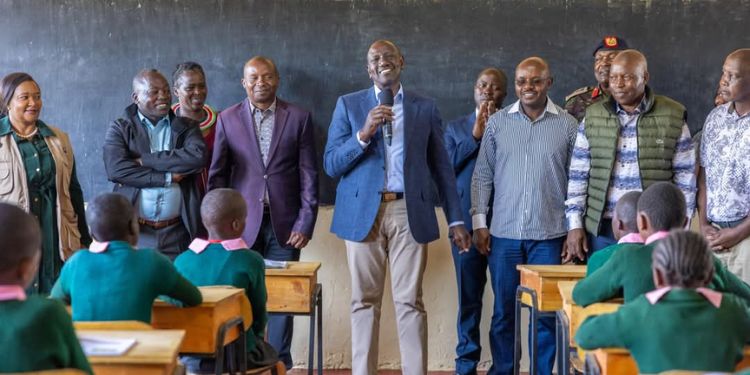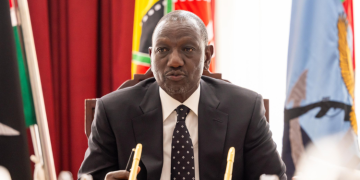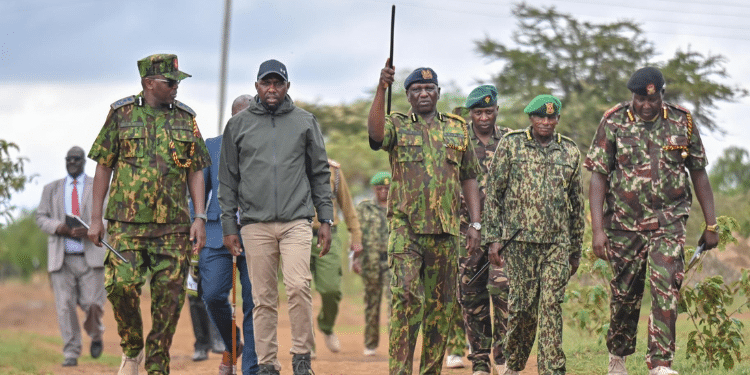After years of banditry and unrest, the government’s multi-agency peace efforts under Operation Maliza Uhalifu are beginning to bear fruit in the troubled North Rift region.
Schools have reopened, markets are buzzing again, and transport services—once crippled by insecurity—have resumed in the North Rift counties.
Banditry has been one of the country’s most pressing security challenges. Brazen bandits, armed with illegal firearms, unleashed terror across at least seven counties.
They stole livestock, left behind trails of bloodshed, and forced thousands from their homes.
The progress has been credited to security agencies adopting a softer, community-centred approach that has appealed to locals.
In areas once synonymous with gunfire, silence now prevails, bandits cornered by security forces are now surrendering, and displaced families are returning home to rebuild their lives.
Counties that had long been hotspots of violence—Baringo, West Pokot, Turkana, Laikipia, Samburu, and Elgeyo Marakwet—are showing signs of calm.
Govt’s Operation Maliza Uhalifu Reopens Schools in the North Rift
Yet, beneath the scenic hills and valleys lies a community still healing from years of ruthless banditry.
For many residents, recovery remains a long journey, but one they are determined to walk, supported by security forces.
Learning resumed at Cheptulel Boys Secondary School in West Pokot after it was closed for three years due to insecurity.
The school was among dozens that had been closed due to banditry incidents in the region.
At least 73 students were forced to relocate to Surumben Boys School in Sigor Constituency, but now that peace has been restored, they are back to their former school, reuniting with their peers.
Also Read: Murkomen Announces Scholarships for Bandits
Launched in February 2023, Operation Maliza Uhalifu North Rift is a government security initiative targeting escalating banditry, cattle rustling, and violence in nine counties: Baringo, Turkana, Samburu, Elgeyo Marakwet, West Pokot, Marsabit, Laikipia, Isiolo, and Meru.
Hot spot areas in these counties were designated as “Disturbed” and “Dangerous,” in the operation that brought together the National Police Service (NPS) and the Kenya Defence Forces (KDF) in a coordinated effort to restore peace and stability in the region.
Security officers on the ground have effectively disarmed hundreds of bandits, dismantled their hideouts in the rugged terrain, and restored stability to affected communities.
How Banditry was Successfully Neutralized
KDF Major Yusuf Sora explained that leadership engagement has been central to peace efforts.
“We have done key leadership engagement where we bring elders together to provide solutions. For example, we have encouraged them to form grazing committees among the communities to help end conflicts between one community and another,” he said in an earlier interview.
In Turkana County, the KDF, in partnership with non-governmental organizations, rolled out civil-military cooperation programmes.
“We normally conduct such activities from time to time based on the needs of the community. We could call upon the residents of the Lomo area, through their local leadership, to provide them with fresh water, foodstuffs, as well as medical services,” said Lt. Ishmael Papaa of the KDF.
The Commander of Operation Maliza Uhalifu, Brigadier Stephen Huria noted that continuous engagement with elders and the youth has helped nurture reconciliation.
“We have been holding public barazas with elders from both sides and with the youth, encouraging them to embrace peace and share information among themselves,” he said.
Also Read: Murkomen Declares Full-Scale KDF, Police Operation
Security agencies have also stepped up intelligence-led patrols to dismantle banditry networks.
“Officers go to the markets as part of our routine patrols because stolen animals often end up there. Through intelligence, we have been able to arrest suspects and recover animals in the markets,” said J. K. Limo.
Unlike previous crackdowns, this operation has prioritised long-term strategies. Brigadier Huria, Commander of Operation Maliza Uhalifu, emphasised that the focus is on coexistence.
“What we are doing is including the community itself in the peace initiatives. We have peace ambassadors, elders, and herders coming together to coexist,” he said.
Faith leaders have also been involved in reinforcing the peace message. Canon Peter Choi of the ACK Church said religious diplomacy has played a critical role in bringing communities together. “Religious leaders have been instrumental in preaching peace and fostering unity in the region,” he noted.
Follow our WhatsApp Channel and X Account for real-time news updates.






















































![Senator Allan Chesang And Chanelle Kittony Wed In A Colourful Ceremony [Photos] Trans Nzoia Senator Allan Chesang With Channelle Kittony/Oscar Sudi]( https://thekenyatimescdn-ese7d3e7ghdnbfa9.z01.azurefd.net/prodimages/uploads/2025/11/Trans-Nzoia-Senator-Allan-Chesang-with-Channelle-KittonyOscar-Sudi-360x180.png)




















